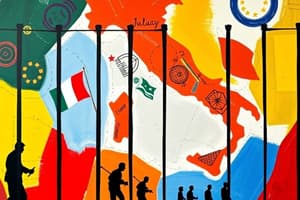Podcast
Questions and Answers
What perspective does the concept of externalisation primarily assume?
What perspective does the concept of externalisation primarily assume?
- Global economic perspective
- Postcolonial perspective
- Non-state-centric perspective
- State-centric perspective (correct)
Which actors have been discussed in relation to externalisation besides state actors?
Which actors have been discussed in relation to externalisation besides state actors?
- Regional governmental bodies
- International, non-governmental organizations, and civil society actors (correct)
- Only international agents
- Only private for-profit actors
What has contributed to the presentism of European externalisation studies?
What has contributed to the presentism of European externalisation studies?
- Politics around the identity of the European project (correct)
- Global migration trends
- Economic policies of the EU
- International relations with neighboring countries
What do existing studies on externalisation focus on in terms of policies?
What do existing studies on externalisation focus on in terms of policies?
What significant aspect about the Union’s self-representation is noted in the research?
What significant aspect about the Union’s self-representation is noted in the research?
Which of the following best describes the contribution of research mentioned regarding externalisation?
Which of the following best describes the contribution of research mentioned regarding externalisation?
According to the authors, what is the agency of different actors in externalisation policies?
According to the authors, what is the agency of different actors in externalisation policies?
What is suggested to be a limitation in externalisation studies?
What is suggested to be a limitation in externalisation studies?
What is one of the primary critiques of the concept of EU externalisation in migration policy?
What is one of the primary critiques of the concept of EU externalisation in migration policy?
Which term describes the conventional roles assigned to non-EU actors in relation to European policies?
Which term describes the conventional roles assigned to non-EU actors in relation to European policies?
According to Arlene Tickner, what concept is better suited for understanding state practices in non-Western contexts?
According to Arlene Tickner, what concept is better suited for understanding state practices in non-Western contexts?
What do non-EU countries like Morocco, Libya, and Turkey often do regarding EU's externalisation policies?
What do non-EU countries like Morocco, Libya, and Turkey often do regarding EU's externalisation policies?
What does the critique of ‘decentring’ Europe in international politics aim to emphasize?
What does the critique of ‘decentring’ Europe in international politics aim to emphasize?
What is one motivation for non-EU states to engage with EU migration policies?
What is one motivation for non-EU states to engage with EU migration policies?
What kind of approach does the recent literature on migration policy encourage concerning non-EU actors?
What kind of approach does the recent literature on migration policy encourage concerning non-EU actors?
Which statement best encapsulates the authors' view on externalisation?
Which statement best encapsulates the authors' view on externalisation?
What is a key focus of Hardt and Negri's work 'Empire'?
What is a key focus of Hardt and Negri's work 'Empire'?
What do Heller and Pezzani discuss in their 2016 publication?
What do Heller and Pezzani discuss in their 2016 publication?
What is the focus of Menjívar's work regarding immigration law?
What is the focus of Menjívar's work regarding immigration law?
What is a significant characteristic of non-state actors in countries of transit and origin?
What is a significant characteristic of non-state actors in countries of transit and origin?
What does the work of Mezzadra and Neilson emphasize regarding borders?
What does the work of Mezzadra and Neilson emphasize regarding borders?
What does the concept of 'externalisation' challenge?
What does the concept of 'externalisation' challenge?
What is the context of Hess's ethnographic analysis?
What is the context of Hess's ethnographic analysis?
What does 'routes management' refer to?
What does 'routes management' refer to?
Which of the following represents a key theme in the work of Moisio and Paasi?
Which of the following represents a key theme in the work of Moisio and Paasi?
How are migrants categorized upon arrival at European shores?
How are migrants categorized upon arrival at European shores?
What do Heller and Pezzani investigate in their 2018 study?
What do Heller and Pezzani investigate in their 2018 study?
What aspect of border management does ‘internalisation’ indicate?
What aspect of border management does ‘internalisation’ indicate?
What aspect of Indian migration is explored by Mongia?
What aspect of Indian migration is explored by Mongia?
What is highlighted by the need to rethink inside/outside assumptions?
What is highlighted by the need to rethink inside/outside assumptions?
What role do international organizations play regarding routes?
What role do international organizations play regarding routes?
What is a consequence of the blurriness between inside and outside in border management?
What is a consequence of the blurriness between inside and outside in border management?
What distinguishes non-state actors from traditional state actors in the context of externalisation?
What distinguishes non-state actors from traditional state actors in the context of externalisation?
What role do for-profit actors played in the migration context according to the content?
What role do for-profit actors played in the migration context according to the content?
How does the involvement of merchant ships complicate the understanding of externalisation?
How does the involvement of merchant ships complicate the understanding of externalisation?
What is a primary criticism of the state-centric view of externalisation?
What is a primary criticism of the state-centric view of externalisation?
Which of the following statements is true about externalisation and spatiality?
Which of the following statements is true about externalisation and spatiality?
In what way can research on externalisation politics be beneficial?
In what way can research on externalisation politics be beneficial?
What is one of the economic implications for shipowners involved in migrant rescue operations?
What is one of the economic implications for shipowners involved in migrant rescue operations?
Which of the following best describes the relationship between states and non-state actors in migration?
Which of the following best describes the relationship between states and non-state actors in migration?
What was the main event associated with the symposium mentioned?
What was the main event associated with the symposium mentioned?
Which grant supported Paolo Cuttitta's work?
Which grant supported Paolo Cuttitta's work?
Who among the participating contributors is noted for participating in the workshop?
Who among the participating contributors is noted for participating in the workshop?
What is a primary theme of Paolo Dahinden's work mentioned in the content?
What is a primary theme of Paolo Dahinden's work mentioned in the content?
Which publication discusses migrant illegality and its everyday implications?
Which publication discusses migrant illegality and its everyday implications?
What type of fellowship supported Maribel Casas Cortés' work?
What type of fellowship supported Maribel Casas Cortés' work?
Which author addressed the topic of externalizing migration governance in civil society?
Which author addressed the topic of externalizing migration governance in civil society?
Which geographical context is examined in Dickson's work?
Which geographical context is examined in Dickson's work?
Flashcards
Externalisation
Externalisation
The practice of shifting responsibility for managing borders or migration issues to other countries, often outside of the European Union.
Postcolonial presentism
Postcolonial presentism
Research that focuses on the present without considering historical context or precedents.
State-centric bias
State-centric bias
The tendency for externalisation research to prioritize state-centric perspectives, overlooking the roles of non-state actors.
Non-state actors
Non-state actors
Signup and view all the flashcards
Agency
Agency
Signup and view all the flashcards
Bordering assemblages
Bordering assemblages
Signup and view all the flashcards
Re-occurrence vs. New Development
Re-occurrence vs. New Development
Signup and view all the flashcards
Decolonization narrative
Decolonization narrative
Signup and view all the flashcards
Migration Industry
Migration Industry
Signup and view all the flashcards
Entanglement
Entanglement
Signup and view all the flashcards
Autonomous Non-state Actors
Autonomous Non-state Actors
Signup and view all the flashcards
Externalisation Practices
Externalisation Practices
Signup and view all the flashcards
Push-backs
Push-backs
Signup and view all the flashcards
Challenge to Territoriality
Challenge to Territoriality
Signup and view all the flashcards
Rationalist/Materialist Bias in International Relations
Rationalist/Materialist Bias in International Relations
Signup and view all the flashcards
EU Externalisation
EU Externalisation
Signup and view all the flashcards
Eurocentrism in EU Externalisation
Eurocentrism in EU Externalisation
Signup and view all the flashcards
Agency of Non-EU Actors in Migration Policy
Agency of Non-EU Actors in Migration Policy
Signup and view all the flashcards
State Autonomy
State Autonomy
Signup and view all the flashcards
Postcolonial Critique of Westphalian Sovereignty
Postcolonial Critique of Westphalian Sovereignty
Signup and view all the flashcards
Autonomy as a Form of Resistance
Autonomy as a Form of Resistance
Signup and view all the flashcards
Decentring Europe in International Relations
Decentring Europe in International Relations
Signup and view all the flashcards
Inside/Outside Ambiguity
Inside/Outside Ambiguity
Signup and view all the flashcards
Non-state actors in externalisation
Non-state actors in externalisation
Signup and view all the flashcards
Migration Routes
Migration Routes
Signup and view all the flashcards
Differential Inclusion
Differential Inclusion
Signup and view all the flashcards
Re-occurrence of Externalisation
Re-occurrence of Externalisation
Signup and view all the flashcards
Maritime Carceral Policies
Maritime Carceral Policies
Signup and view all the flashcards
Instrumentalising the Sea
Instrumentalising the Sea
Signup and view all the flashcards
Privatised Push-backs
Privatised Push-backs
Signup and view all the flashcards
Shifting Practices of Border Control
Shifting Practices of Border Control
Signup and view all the flashcards
Border as Method
Border as Method
Signup and view all the flashcards
Colonial Genealogy
Colonial Genealogy
Signup and view all the flashcards
De-migranticization of research
De-migranticization of research
Signup and view all the flashcards
Migrant illegality and deportability
Migrant illegality and deportability
Signup and view all the flashcards
Externalizing migration governance
Externalizing migration governance
Signup and view all the flashcards
Agency in externalization
Agency in externalization
Signup and view all the flashcards
Decolonization narrative of EU
Decolonization narrative of EU
Signup and view all the flashcards
Re-occurrence vs. new development in migration policy
Re-occurrence vs. new development in migration policy
Signup and view all the flashcards
Study Notes
Externalisation in Migration and Border Studies
- Externalisation is the process where states operate border control activities outside their sovereign territory, often in other countries or on the high seas.
- This process involves a multi-scalar dynamic, extending beyond fixed borders to mobile management points and zones.
- Non-state actors, like NGOs and private entities, are increasingly involved in border management, altering sovereignty.
- Externalisation is not a new phenomenon, having roots in historical practices like colonial-era migration control and anti-slavery efforts.
- Current practices have grown significantly in the last two decades, particularly seen in the European Union and other countries globally.
Rethinking Externalisation
- Externalisation research has largely focused on the present, but neglecting past colonial and imperial contexts.
- A postcolonial perspective is needed to analyze externalization, examining its continuity with colonial history and decolonisation.
- Eurocentrism has influenced the study of externalisation, primarily focusing on the EU/Western cases.
- Migration and border dynamics are not only influenced by the 'center' (wealthy countries) but also by 'margins' - countries of origin and transit.
- It is crucial to understand the dynamics and agency of non-state actors and their influence on externalisation policies.
Externalisation, State-Centrism, and Non-State Actors
- Externalisation fundamentally relies on state territoriality, with neat boundaries and sovereignty.
- Non-state actors play significant roles in externalisation though, including international organizations, NGOs, and private actors.
- Non-state actors shape and transform externalisation, potentially questioning state externalisation entirely.
- State-centric bias needs to be overcome by exploring the multitude of actors and relations involved in border management.
- Studying assemblages, or combinations of actors, territories, and devices can further understand how these non-state and states actors interact.
Beyond Eurocentrism
- Externalisation studies have often focused on Europe, neglecting other global contexts.
- Critiques of Eurocentrism in externalization encourage analysis of non-western actors and countries.
- State autonomy and symbolism are critical for understanding non-EU externalization cases.
- Autonomy includes resource availability and navigating international relationships.
- Symbolic politics relates to how internal and external policies intersect.
Challenging the Inside/Outside Divide
- Externalisation relies on interior/exterior divisions, which needs to be challenged.
- Considering previous colonial and imperial relations helps challenge the fixed inside/outside borders.
- Understanding migration from the perspective of routes and their varied actors (not just states) is critical.
- Internal and external interactions and agency is complex; externalization can be seen as both internal and external, and delocalized.
- The division between externalization and internalization is unclear and should be studied further.
Studying That Suits You
Use AI to generate personalized quizzes and flashcards to suit your learning preferences.




